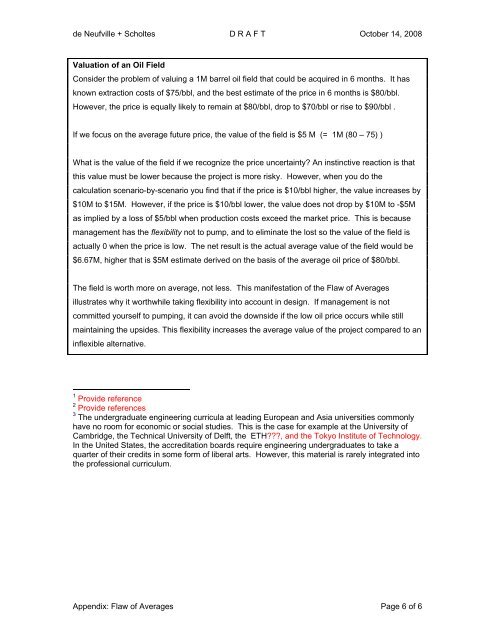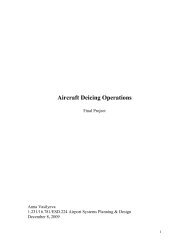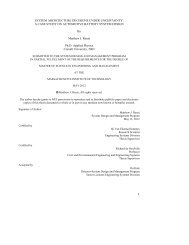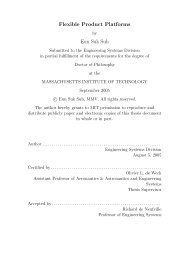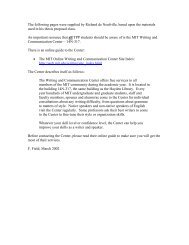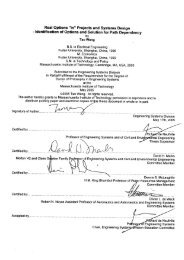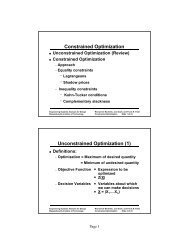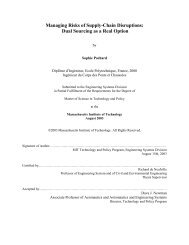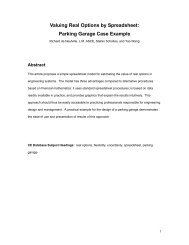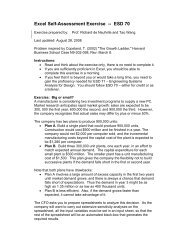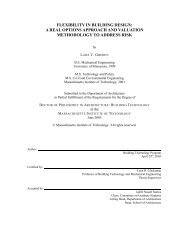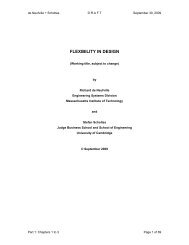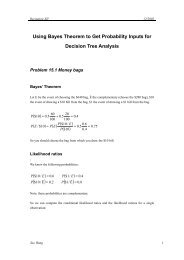Appendix -- Flaw of Averages.pdf - Richard de Neufville
Appendix -- Flaw of Averages.pdf - Richard de Neufville
Appendix -- Flaw of Averages.pdf - Richard de Neufville
Create successful ePaper yourself
Turn your PDF publications into a flip-book with our unique Google optimized e-Paper software.
<strong>de</strong> <strong>Neufville</strong> + Scholtes D R A F T October 14, 2008Valuation <strong>of</strong> an Oil FieldConsi<strong>de</strong>r the problem <strong>of</strong> valuing a 1M barrel oil field that could be acquired in 6 months. It hasknown extraction costs <strong>of</strong> $75/bbl, and the best estimate <strong>of</strong> the price in 6 months is $80/bbl.However, the price is equally likely to remain at $80/bbl, drop to $70/bbl or rise to $90/bbl .If we focus on the average future price, the value <strong>of</strong> the field is $5 M (= 1M (80 – 75) )What is the value <strong>of</strong> the field if we recognize the price uncertainty? An instinctive reaction is thatthis value must be lower because the project is more risky. However, when you do thecalculation scenario-by-scenario you find that if the price is $10/bbl higher, the value increases by$10M to $15M. However, if the price is $10/bbl lower, the value does not drop by $10M to -$5Mas implied by a loss <strong>of</strong> $5/bbl when production costs exceed the market price. This is becausemanagement has the flexibility not to pump, and to eliminate the lost so the value <strong>of</strong> the field isactually 0 when the price is low. The net result is the actual average value <strong>of</strong> the field would be$6.67M, higher that is $5M estimate <strong>de</strong>rived on the basis <strong>of</strong> the average oil price <strong>of</strong> $80/bbl.The field is worth more on average, not less. This manifestation <strong>of</strong> the <strong>Flaw</strong> <strong>of</strong> <strong>Averages</strong>illustrates why it worthwhile taking flexibility into account in <strong>de</strong>sign. If management is notcommitted yourself to pumping, it can avoid the downsi<strong>de</strong> if the low oil price occurs while stillmaintaining the upsi<strong>de</strong>s. This flexibility increases the average value <strong>of</strong> the project compared to aninflexible alternative.1 Provi<strong>de</strong> reference2 Provi<strong>de</strong> references3 The un<strong>de</strong>rgraduate engineering curricula at leading European and Asia universities commonlyhave no room for economic or social studies. This is the case for example at the University <strong>of</strong>Cambridge, the Technical University <strong>of</strong> Delft, the ETH???, and the Tokyo Institute <strong>of</strong> Technology.In the United States, the accreditation boards require engineering un<strong>de</strong>rgraduates to take aquarter <strong>of</strong> their credits in some form <strong>of</strong> liberal arts. However, this material is rarely integrated intothe pr<strong>of</strong>essional curriculum.<strong>Appendix</strong>: <strong>Flaw</strong> <strong>of</strong> <strong>Averages</strong> Page 6 <strong>of</strong> 6


